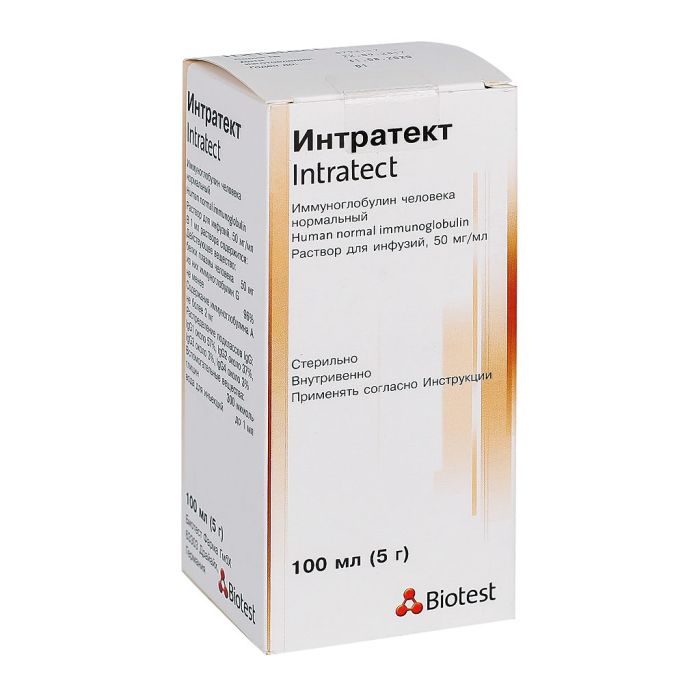Human immunoglobulin normal | Intratekt solution for infusion 50 mg / ml vials of 100 ml
Special Price
$620
Regular Price
$693
In stock
SKU
BID463977
Packaging
Fl. 100 ml
Pharmacological action of
Intratect compensates for the deficiency of antibodies, has an immunomodulatory effect.
Indications for allergic and atrophic rhinitis in children and adults
for the prevention and comprehensive treatment of acute respiratory viral infections and influenza during the unfavorable epidemic
for daily hygiene of the nasal cavity
after surgical interventions in the nasal cavity and paranasal sinuses immunodeficiency states of
in idiopathic thrombocytopenic purpura
in the prevention and treatment of infectious diseases of
as a therapeutic component go complex with Kawasaki syndrome.
Contraindications
hypersensitivity to any component of the drug Intratect
hypersensitivity to human Ig, especially in rare cases of IgA blood deficiency and the presence of antibodies against IgA.
Use during pregnancy and lactation
The absence of risk of using this drug during pregnancy has not been studied in controlled clinical trials, so it should be used during pregnancy and lactation after a thorough assessment of the risk and benefits. Long-term experience in the medical use of Ig does not allow us to expect any harmful effects on the course of pregnancy, as well as on the fetus and newborn. The Ig administered is excreted in human milk and may facilitate the transfer of protective antibodies to newborns.
Composition
1 ml contains human plasma proteins 50 mg
Side effects
Side effects are possible such as chills, headache, fever, nausea, vomiting, allergic reactions, aching joints and slight back pain.
In rare cases, Ig can cause a sudden drop in blood pressure and, in rare cases, anaphylactic shock, even if the patient did not show hypersensitivity during the previous administration of the drug.
In connection with the introduction of human Ig, there were cases of signs of aseptic meningitis and, in rare cases, hemolytic anemia / hemolysis, as well as transient skin reaction (rash or hyperemia), which completely disappeared after discontinuation of therapy. An increase in serum creatinine and / or acute renal failure has also been observed.
In rare cases, patients with signs of cerebral or cardiac ischemia (impaired blood supply to the brain or heart), as well as patients with overweight or severe hypovolemia, had thromboembolic complications.
In case of intolerance reactions, it is necessary either to reduce the rate of drug administration or to suspend its infusion. The choice of appropriate measures depends on the type and severity of the side effect.
In case of a negative effect on renal function, Ig therapy should be discontinued.
In case of shock, follow current guidelines for anti-shock therapy.
When using drugs from human blood or plasma, it is impossible to completely eliminate the risk of transmission of known and yet unknown viral diseases. To reduce the risk of transmission of pathogens, donor selection is carried out according to strict criteria, donor plasma is tested and selected, and a plasma pool is monitored. Steps for removing and / or inactivating pathogens are included in the manufacturing process.
Drug Interactions
Live Viral Vaccines: Ig administration can negatively affect the effectiveness of live vaccines against viral diseases such as measles, rubella, mumps and chickenpox for 6 weeks and up to 3 months. Vaccination with an appropriate live vaccine should be given no earlier than 3 months after the introduction of Intratect. In the case of measles vaccination, this effect of Ig can last up to 1 year. Before the expiration of this period, measles vaccination should be carried out after determining if the patient has the appropriate antibodies.
Serological laboratory tests: after the administration of Ig, a temporary increase in the titer of various passively introduced antibodies is possible, which can lead to false positive analysis results in a serological study.
Passively introduced antibodies against red blood cell antigens (e.g. A, B, D) can affect serological parameters such as the level of red blood cell alloantibodies (e.g. Coombs reaction) and the number of reticulocytes, haptoglobin test.
Overdose
Overdosing in patients at risk, especially the elderly, as well as patients with impaired renal function, can lead to hypervolemia and increased blood viscosity.
Storage Conditions
In a dark place at a temperature not exceeding 25 РC (do not freeze).
Terms of pharmacies holiday
Prescription
Dosage form
infusion solution
Biotest AG, Germany
Submit your review to Earn 10 Reward Points click here to login
Write Your Own Review

